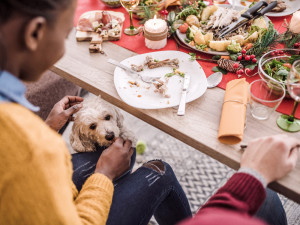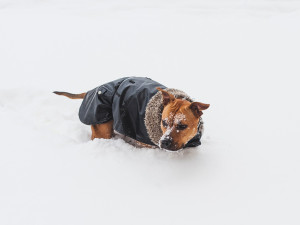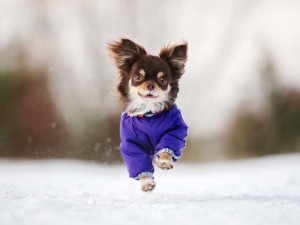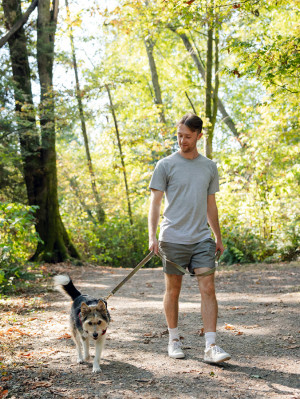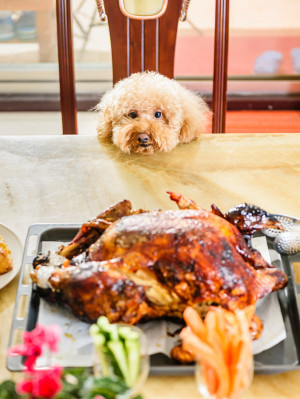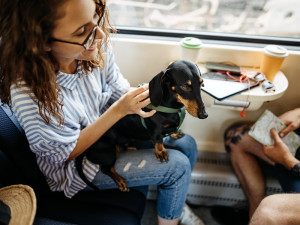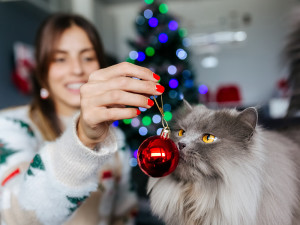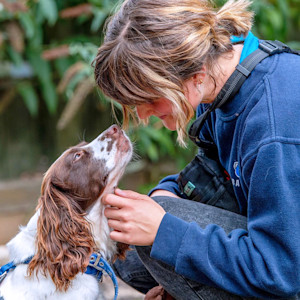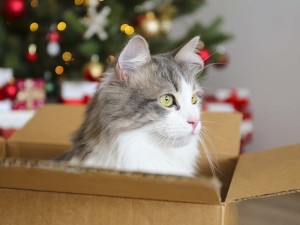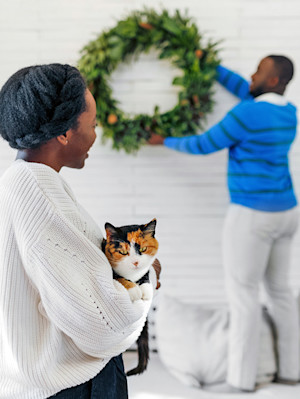How to Advocate For Your Dog This Christmas
All your dog wants for Christmas is a bodyguard to keep them safe from unfamiliar sights and sounds
While it may be the most wonderful time of the year for us humans, the holiday season can be a chaotic time for our pups that leaves them feeling overwhelmed.
And while the holiday season is wonderful, even the most hardened Santa stan probably finds the run up a little stressful: the financial strains, planning, prepping, making sure you’re not upsetting family and friends...
Now look at this time through a dog’s eyes – their humans are more stressed, children in the home are more excitable, there’s flashing lights, decorations, singing, parties, unfamiliar people, and there may even be a tree (that they’re definitely not allowed to pee on) in their home.
It’s a lot.
So, while you’re planning and prepping for the best of occasions, allow us to guide you through that prep in a way that means your dog is accommodated to ensure that all that festive cheer doesn’t lead to festive fear.
Why advocacy matters for your dog during the holidays
As the spokesperson for our dogs, who cannot easily communicate their needs to the humans they come into contact with, it’s important to advocate for our dogs at all times of the year. But this is even more important during the holidays, when excitement levels rise and your dog’s body language is more likely to be missed.
For people who are very dog-minded and used to reading their body language, it will (hopefully!) be easy for them to act appropriately around your dog. But for those members of your family and friendship circles who are either uncomfortable around dogs or just don’t really know how best to interact with them, you are there to be your dog’s bodyguard.
With changes in routine and the increased stimulation of people visiting, flashing lights and lots of noise, our dogs can find it hard to cope. If this is also paired with unfamiliar environments if you’re travelling over the holiday period, then this can be even more tricky for them.
How to prepare your dog for the holiday season
Whether it’s creating the holiday menu, wrapping presents or decorating the home for guests, preparing for your dog’s involvement in the holiday traditions is just as important.
Are you someone who gets the tree up just after Halloween? Consider making changes to your house slowly. Try not to add all the ornaments, lights, tree and other decorations all at once. Allow your dog the time to adjust to changes bit by bit.
When taking walks, try to give your neighbour’s 10ft inflatable snowman a miss. As people put up their decorations and the neighbourhood begins to change, think about a balance in your week – a combination of road walks, where you can enjoy the festive sights, and easy forest or field walks, where your dog just gets to sniff and not see too many changes.
Communicate with family and friends in advance. If you’re travelling, make sure your hosts know you’re planning to bring your dog. Equally, if you’re welcoming guests to your home, find out if any of them are uncomfortable around dogs (due to allergies or fears). Knowing the lay of the land in advance can allow you to make sure you get your prep right.
If you’re staying at home, create a safe space now for your dog, out of the way of the main entertaining areas. A bed in a calm area or some blankets piled up under your bed for example, can allow your dog the choice between staying with you or seeking solace. You can also start to get your dog used to enjoying some filled food toys or free work (enrichment through choice, sniffing and independent exploration) behind a child gate now – before guests arrive – so that they get used to solo time being enjoyable, should you need to exclude them for any periods of time.
Prep plenty of food toys and collect together long lasting chews that can provide some entertainment while festive feasts are being eaten or presents opened. Make sure you have treats prepped in little pots around your home, ready to reward your dog when they make great choices over the holiday season.
Advocating for your dog around guests and family
Whenever we mix different households together, there’s a chance things can get stressful. Whether it’s disagreements over the best time to eat, intense games of charades or political differences between family members – let’s not involve your dog in the drama!
Set up a group message thread in advance. Sending guidelines to everyone before you see each other IRL as to how you’d like them to interact with your dog. This means that not only have they had time to read and digest the information, it also means that everyone’s had the same message so they can remind each other throughout the celebrations.
Prepare to be firm when it comes to what they can feed your dog (chocolate is toxic to dogs Aunty Doris!) or how they are best to greet them on arrival. Having a visual cue for the humans – such as a list of unsafe foods for dogs pinned to your fridge – can be useful.
Try to avoid telling the humans what they can’t do, but rather what they can. People (like dogs!) respond much better to positive encouragement rather than negative chastising. It makes them much more likely to get on board. For example, swap out “don’t touch the dog” with “throw a treat to the dog’s bed on arrival”.
Keeping your dog safe from holiday hazards
When it comes to keeping our dogs safe over the holiday season, the list of hazards is pretty long! We all want to avoid a stressful – and costly – trip to the emergency vets, so make sure everyone you are mixing with knows the safe foods your dog can eat. Or better yet, put a simple ‘no feeding the dog’ rule in place.
It’s not just food that can cause issues. Glass baubles, fake snow, anti-freeze, alcohol and even some kids’ toys can bring their own dangers. Remember it doesn’t matter if your tree or home look perfect as long as your dog is safe. Swap to wooden baubles or keep things up high. And don’t leave gifts under the tree if your dog is a keen ripper or chewer...
While people are bringing bags in and out of your home on arrival, make sure there’s somewhere safe for your dog to be – don’t trust that everyone will remember to close doors behind them. We don’t want to risk your dog escaping.
Tips for travelling with dogs over the holidays
While playing host can seem like the more stressful option, it can sometimes be easier as at least your dog is in their own familiar space.
If you’re travelling with your dog this season, make sure you ask in advance about the rules around your dog in the home. Do they have a no dogs on furniture rule, for example? Or will they want your dog to sleep in the kitchen when you’re used to them sleeping in your room? Having conversations in advance will take away the stress of needing to make last-minute adaptations for your dog.
On the actual journey, plan plenty of time to allow extra stops if you’re driving. Feed a smaller meal in advance of travel, then use the rest of their food during stops for them to have some calm sniffing time like hunting for food in the grass or smeared on a lick mat.
If you‘re travelling on a train, make sure to book in advance and remember that the train will be full of unfamiliar scents, so something that has your dog’s own scent can be enormously comforting. Stay in physical contact with your dog, speak to them in a soothing tone, and offer treats or rewards for calm behaviour. Be aware though that if they are scared or stressed, they may not respond or take the treats. A chew toy is a good alternative as chewing helps dogs relax and gives them something to focus on.
Take familiar items with you for when you reach your destination too, including their bed or blankets (unwashed, so they smell the same), usual food, and even some bottled water from your home taps if you’re changing from a hard water area to a soft one.
Advocating for your dog’s emotional needs
Whether your dog is a social diva or more of an introvert, the holiday season can be a lot for them to process emotionally. The emotional well-being of our dogs should always be the number one priority.
Remember there can be such a thing as too much of a good thing. While your dog may look like they‘re having the time of their life, if you notice they’re finding it hard to rest, jumping all over everyone, or having the zoomies repeatedly – it’s time for some downtime! Take a human-only walk, leaving your dog to have a much-needed snooze or take your dog for a solo, relaxed sniffy walk away from visitors.
If your dog is prone to being more anxious, be especially mindful of their body language. Are they showing subtle signs of avoidance like lip licking, ears back, tail tucked, leaning away? Are they yawning a lot and regularly doing a full-body shake-off? Are they at a higher rate of stress – pacing, whining, or, more worryingly, snapping or biting? Time to take them away to chill out.
Be ready to create space for your dog. Be ready to speak up for your dog and move them away from well-meaning family if they’re not listening to you.
Post-holiday recovery tips
One of the best gifts you can give your dog this Christmas is the gift of sleep – or at least, rest. Sleep and rest allow your dog to process the emotions they’ve been feeling, to reduce the troublesome stress hormone ‘cortisol’ and be able to get back to a calmer place.
Take slow, sniffy walks; encouraging your dog to get their nose to the ground without the need to meet lots of people or dogs. Pair these calm walks with some days where you only venture out with them to facilitate toileting, then provide entertainment through chew toys, sniffing for small pieces of food in your garden, training or cuddles on the sofa.
If your holiday season has been filled with a lot of human time, start to slowly move back towards a normal routine so that it’s not a lonely shock if you’re about to return to work. Add in regular solo time, so your dog doesn’t feel uncomfortable when you start to leave them again for longer periods.
While Christmas comes but once a year, not all the gifts it provides are positive ones. Even the most sociable of dogs (and humans!) can find the chaos a little much.
Try and create as much balance as you can over the holiday season – adding in calm downtime amongst all the festivities and fun.
And always remember, you are your dog’s voice. Use it wisely.


